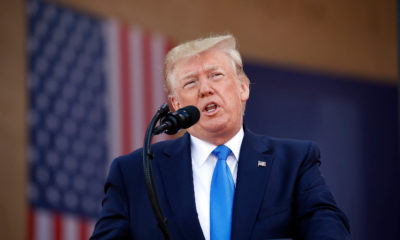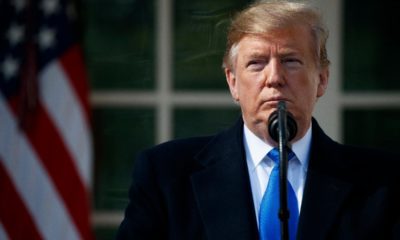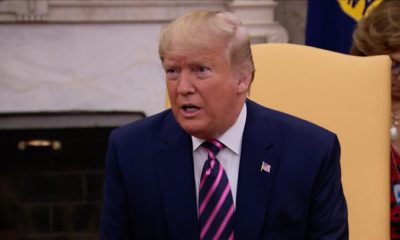World
Sanders vows to prevent Trump being elected US President
 Washington:Democratic presidential candidate Bernie Sanders has vowed to prevent Republican Donald Trump from becoming the US president amid concerns about further damage to party unity deriving from his continued stay in the race.
Washington:Democratic presidential candidate Bernie Sanders has vowed to prevent Republican Donald Trump from becoming the US president amid concerns about further damage to party unity deriving from his continued stay in the race.
“Needless to say, I am going to do everything in my power, and I will work as hard as I can to make sure Trump does not become president of the US,” Xinhua quoted Sanders as saying here on Thursday after his meeting with US President Barack Obama.
“It is unbelievable to me … that the Republican Party would have a candidate for president who in 2016 makes bigotry and discrimination the cornerstone of his campaign,” he said.
Meanwhile, Sanders said he already talked with Hillary Clinton after she amassed enough delegates needed to notch up the nomination on Tuesday.
Sanders said he and the former Secretary of State would speak soon about how to “work together” to defeat Trump.
However, Sanders still declined to endorse Clinton at the moment and insisted he would take part in the last nomination contest next week.
As the Democratic primary season was all but over, the notion of party unity had become a crucial topic in the Democratic field.
Despite his mathematical elimination from the race, Sanders had earlier pledged to continue the fight into the national convention in July when party nomination would be formally announced.
However, Sanders later also indicated that he would “assess” his path to victory in the wake of California’s primary which was held on Tuesday.
Clinton notched up an easy victory by two-digit lead in California.
Sanders’ meeting with Obama in the White House was part of the Vermont senator’s busy schedule in Washington on Thursday. He would also meet Democratic leaders in the US Congress and Vice President Joe Biden.
Unlike the prompt rapprochement reached between Clinton and Obama in 2008 primary season, reconciliation this time between Sanders and Clinton could be elusive.
For one thing, Sanders had for long called himself an independent and democratic socialist, and he joined the Democratic Party only last year to get on the ballot. Therefore, his is less committed to party loyalty than was Clinton eight years ago.
Even more daunting a task this time for party establishment to bridge the Clinton and Sanders divide was the anti-establishment sentiment Sanders had stirred up among disheartened Democratic and independent voters in this chaotic primary season.
According to the most recent YouGov poll released on May 25, half of Sanders’ supporters would turn away from Clinton in a matchup between the former Secretary of State and presumptive Republican nominee Donald Trump.
At the end of April, YouGov poll found that 63 percent of Sanders’ supporters were willing to vote for Clinton.
World
Lockdowns in China Force Urban Communities to Defy Censorship and Vent Frustration Online

Shanghai’s rich middle class is leading a wave of online dissent over the strict and prolonged lockdowns imposed in various parts of the country. Chinese internet censorship is struggling as patience is wearing thin in many urban centers, coming up with creative forms of online protests.
Social Media Posts Revealing Lockdown Tension in Shanghai
Drawn-out lockdowns are nothing new in China as authorities insist with the nation’s zero-Covid policy since the start of the pandemic. Currently over This time around, however, metropolitan areas like Shanghai are increasingly difficult to keep quiet, given that its more than 25 million residents have seen weeks of total isolation along with food shortages and many other service interruptions.
Dozens of towns and reportedly over 300 million Chinese citizens have been affected by lockdowns of different severity. As expected, urban netizens have been most outspoken over their difficulties by finding creative ways to get around state censorship and bans placed on topics, news comments and spontaneous campaigns.
Shanghai residents have been using mobile proxies and hijacking seemingly unrelated hashtags to talk about healthcare issues, delivery failures and the overall severity of their situation. The “positive energy” that the Chinese government wants to transmit during the recent prolonged series of lockdowns does not come naturally to those counting food supplies and online censors are working hard to filter words, trending topics and undesired social media sharing.
WeChat groups and message threads are under constant monitoring. Posts questioning the zero-Covid approach have been quickly deleted, including by leading Chinese health experts like Dr. Zhong Nanshan. Video footage is soon censored and protests and investigations are quickly made to disappear.
Where this has not worked, officials have exposed banners with warnings and outright threats like “watch your own mouth or face punishment”, while drones have been patrolling the city skies. Yet, if anything, this has led to further tensions and unspoken confrontation with Shanghai’s educated and affluent middle class.
Creative Online Solutions Harnessing Civic Energy
Announcements by Chinese social media that they would be publishing the IP addresses of users who “spread rumors” have not helped either. Tech industry research has shown that much of Asia’s tech-savvy population has a habit of using mobile proxies and other privacy tools, quickly finding workarounds to browse the internet freely and talk to the world about the hottest topics.
The sheer volume of forbidden posts is already a challenge for the very censorship system, experts explain. Unable to track all trending hashtags, state workers overlook topics that speak about the US, Ukraine or other popular news. Linking human rights elsewhere to their situation, Chinese online dissidents establish their informal channels and “hijack” the conversation to share personal or publicly relevant information about the Covid suppression in their town.
Sarcastic and satirical posts still dominate. Others hope to evade the censors by replacing words from famous poems or the national anthem. One thing is certain – social media, when harnessed with the right creativity, has proven its ability to mount pressure on the government in even some of the most strictly controlled tech environments like China.























